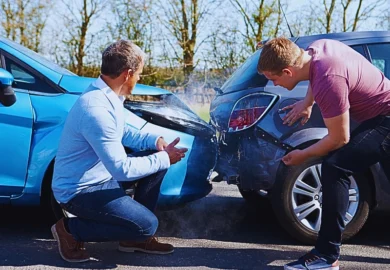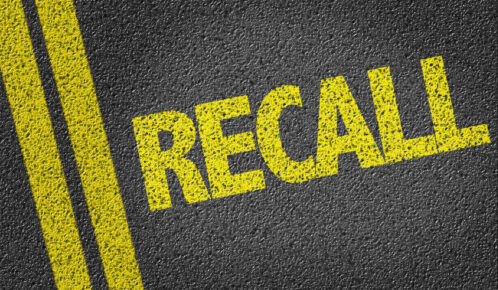If the other driver lies about a car accident, you can protect yourself and prove the truth by collecting strong evidence and working with a motor vehicle accident lawyer. Photos, electronic records, witness accounts, and official reports can help prove you are not at fault and stop false claims before they damage your record and insurance standing.
Table of Contents

For help in Chicago, call Ankin Law at 312-600-0000.
Proving Fault When the Other Driver Lies About a Car Accident
Drivers may lie about car accidents to avoid being found at fault and to claim damages from you. Under the modified comparative negligence system that Illinois follows, both drivers can share a percentage of fault. If you are more than 50% responsible, you cannot recover damages.
Collecting objective evidence is the first step in proving fault. Police reports, electronic records, dashcam footage, photographs, and witness statements can serve as proof supporting your version of events. Details such as the point of impact, tire marks, and the position of the vehicles can help reconstruct the accident scene and highlight inconsistencies in the other driver’s story. In many cases, insurance adjusters and accident reconstruction experts analyze:
- Damage patterns to determine vehicle speeds and angles of impact
- Traffic camera or surveillance footage from nearby businesses or intersections
- Phone records if they suspect distracted driving, such as texting
- Electronic data from the vehicle’s onboard computer (event data recorder or black box)
Many newer cars have black boxes that automatically record information such as speed, braking, steering angle, seatbelt use, and airbag deployment just before and during a crash. When another driver lies, EDR data can prove whether the driver was speeding or whether the driver failed to brake before impact.
Overall, if the other driver makes a false claim, your attorney should have several avenues to pursue to prove you are not at fault and ensure the insurance company does not unfairly deny your claim. Lying about a crash is serious and can constitute insurance fraud. The more credible evidence you have, the harder it becomes for the other person to keep up a false version of events.
Drivers might deny running a red light or lie about being on their phone. Drivers could falsely accuse you of speeding or following too closely. They could lie about passengers or injuries. In short, false claims can take many forms.
Why Collecting Evidence After a Car Accident Is Crucial
When the other driver lies, several types of evidence in a car accident claim can protect you. The more evidence you collect, the easier it should be for your motor vehicle accident lawyer to prove the truth. Evidence counteracts false claims and helps insurance companies, judges, or juries make decisions based on facts.
Additionally, prompt documentation can protect your right to compensation. In Illinois, you generally have two years from the date of a crash to file a personal injury lawsuit. Even within this timeframe, the longer you wait, the harder it becomes to gather reliable evidence. For example, skid marks fade, damaged vehicles get repaired or scrapped, and nearby businesses may overwrite surveillance footage within days or weeks. Witnesses also become harder to locate, and their memories grow less reliable.
How to Protect Yourself From False Claims
False claims can increase your insurance premiums, cause insurers to deny compensation for your injuries, and get lawsuits filed against you. The annual average cost of car insurance in Illinois is $2,074, and even a minor accident can easily cause premiums to go up by hundreds of dollars. Preparation is the best protection.
Stay Calm and Let the Evidence Speak for Itself
Avoid arguing with the other driver at the scene. Stick to exchanging basic information such as name, contact details, insurance, and vehicle registration. Let law enforcement handle statements.
Saying something such as, “I’m sorry,” at the scene (or at any stage of the investigation) could get twisted into an admission of car accident fault or guilt. Let the evidence speak for itself.
File a Police Report
Even if the other driver insists on settling privately, request that an officer respond (or file a report if the police do not show up at the scene). A formal police report adds credibility and makes it harder for the other driver to change his or her story later.
Notify Your Insurance Company Quickly
Provide your insurer with accurate information and mention that the other driver’s version may not be truthful. Insurance companies investigate inconsistencies, and early communication strengthens your position.
Document Every Communication
Keep records of emails, phone calls, and texts between you, the other driver, and any insurance representatives.
Hire a Motor Vehicle Accident Lawyer
A lawyer can guide you on knowing what to expect during a car accident case, communicate with insurers on your behalf, and prevent you from saying or doing something that might hurt your case.
Your attorney can also file subpoenas for phone data, get security footage, and work with reconstruction experts if necessary. False claims could be part of why you need a lawyer after a car accident, too. When you are dealing with lies about a car accident, professional advocacy helps ensure the truth prevails. The more detailed and consistent your documentation is, the less likely that false statements hold up under scrutiny.
Ankin Law can help after a car accident in Chicago. Contact us today.
FAQs About Car Accident Fault and Driver Lies
What Do I Do if The Other Driver Lies About What Happened?
Stay calm, gather as much evidence as possible, and contact a motor vehicle accident lawyer. He or she can help you challenge the false statements and protect your rights.
Can Evidence Really Protect Me From False Claims?
Physical and electronic evidence, witness statements, and expert reconstruction reports can discredit false claims.
Can I Sue Someone for Lying About What Happened?
If lies cause financial harm, such as increased insurance costs or denied compensation, you may be able to take legal action.




